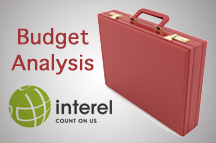 The Chancellor has just thrown everything, including the proverbial kitchen sink, at his disposal into his sixth Budget and will be hoping he has turbocharged Conservative election efforts.
The Chancellor has just thrown everything, including the proverbial kitchen sink, at his disposal into his sixth Budget and will be hoping he has turbocharged Conservative election efforts.
If he succeeds, he will be lauded as central to winning the 2015 General Election and will be in pole position to replace David Cameron when he departs as PM, expected sometime in the next Parliament. If he fails, he will be on the other side of the Despatch Box in June responding to Ed Balls ‘Emergency’ Budget. The stakes could hardly be higher for him or for the country.
In the run up to the Budget his options were limited. The public finances remained tight albeit improving. The Lib Dems were cramping his style, wanting to prove they were curtailing the worst excesses of Conservative rule. And the lack of time between now and the end of the parliamentary session meant there was little scope for far reaching economic reform or legislative change.
 Despite this, the Budget was far from dull, helped in no small part by the economic boost the Chancellor has been given by better tax returns, low inflation and lower borrowing costs.
Despite this, the Budget was far from dull, helped in no small part by the economic boost the Chancellor has been given by better tax returns, low inflation and lower borrowing costs.
At the weekend he claimed there would be no ‘giveaways’ or ‘gimmicks’, but in many ways the budget was just that - a swathe of announcements aimed at maximising the Tory vote on 7 May, by appealing to the ‘Comeback Country’.
Millions of workers will have their personal allowance raised to £11,000. Pensioners secured new flexibilities on annuities. Beer drinkers will be paying less tax on a pint in the pub. And to try and spike the idea the Conservatives are the party of big business, Osborne confirmed details of the Diverted Profits Tax and other measures aimed at ‘tax dodging’ multinationals.
Given the iron message disciple of the Conservative Front Bench, his mantra throughout his statement was unsurprising. There was much talk of the success of the Conservatives’ ‘plan that is working’ and the choice voters face between ‘competence’ versus Labour’s ‘chaos’.
In true electioneering mode, Osborne set what a future Conservative Government might do unrestrained from the shackles of being in a Coalition Government.
This was by far Osborne’s bluest Budget ever. At least in terms of aspiration.
 There can be few more totemic policies for Tory voters than a reduction in income taxes and along with the increase in the personal allowance, he will also be lauded for his commitment to raise to £50k the threshold by which taxpayers start to pay the 40p rate of income tax.
There can be few more totemic policies for Tory voters than a reduction in income taxes and along with the increase in the personal allowance, he will also be lauded for his commitment to raise to £50k the threshold by which taxpayers start to pay the 40p rate of income tax.
And his focus on helping young people get on the housing ladder through a tax free matched saving scheme for first time buyers in the new ‘Help to Buy ISA’ will no doubt hit the headlines and play well with middle class families the length and breadth of the country.
Will it be enough to win the Conservatives the election? Well it just might. And it certainly means Labour will have to recalibrate their attack lines between now and poling day. They will have less scope to accuse the Conservatives of undeliverable and stringent cuts and will be challenged to state whether they will match Osborne’s middle class tax cuts.
This heady mix of tax cuts and big incentives for home ownership was tried before by a Tory Chancellor. His name was Nigel Lawson. The budget was 1987. And he helped return a Tory majority of over 100 a few weeks later.












